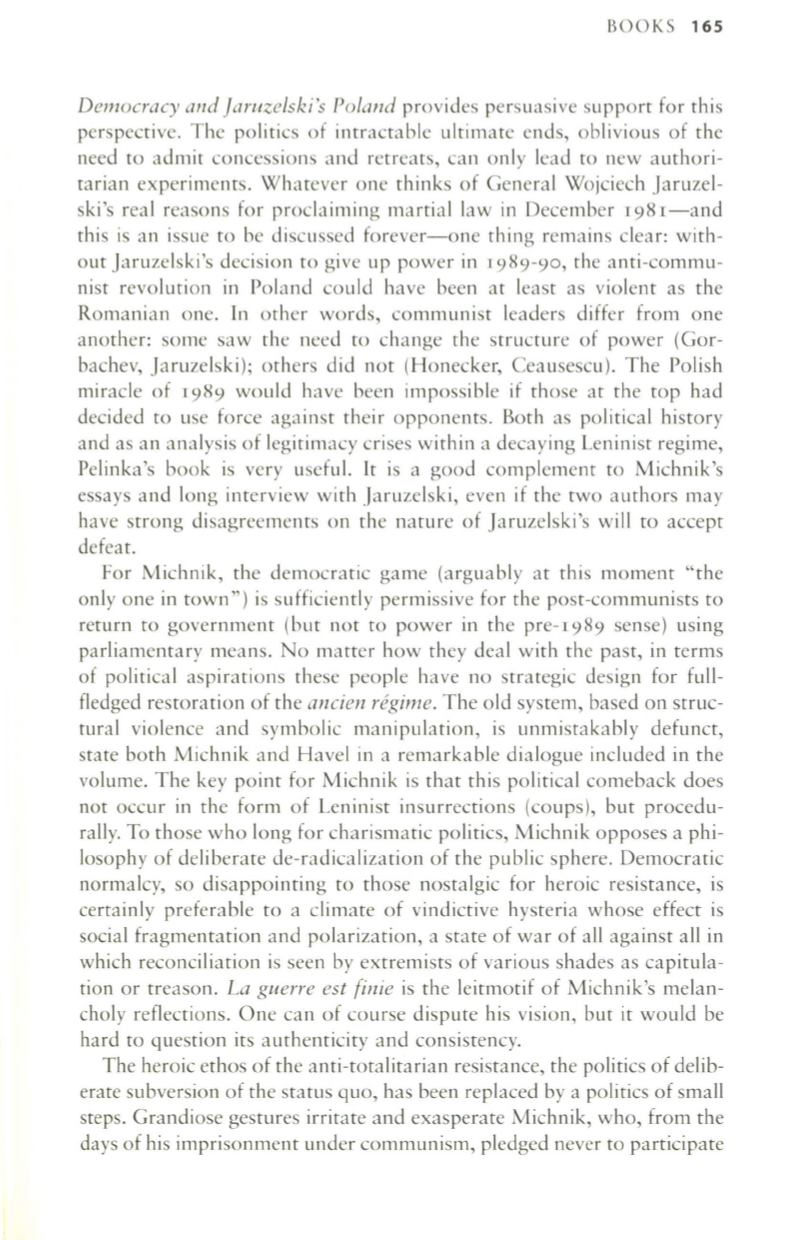
BOOKS
165
Democracy and jaruzelski's Poland
provides persuasive support for this
perspective. The politics of intractable ultimate ends, oblivious of the
need to admit concessions and retreats, can only lead to new authori–
tarian experiments. Whatever one thinks of General Wojciech Jaruzel–
ski's real reasons for proclaiming martial law in December T98r-and
this is an issue to be discussed forever-one thing remains clear: with–
out Jaruzelski's decision to give up power in 1989-90, the anti-commu–
nist revolution in Poland could have been at least as violent as the
Romanian one.
In
other words, communist leaders differ from one
another: some saw the need to change the structure of power (Gor–
bachev, Jaruzelski); others did not (Honecker, Ceausescu). The Polish
miracle of 1989 would have been impossible if those at the top had
decided to use force against their opponents. Both as political history
and as an analysis of legitimacy crises within a decaying Leninist regime,
Pelinka's book is very useful. It is a good complement to Michnik's
essays and long interview with Jaruzelski, even if the two authors may
have strong disagreements on the nature of Jaruzelski's will to accept
defeat.
For Michnik, the democratic game (arguably at this moment "the
only one in town") is sufficiently permissive for the post-communists to
return to government (but not to power in the pre-1989 sense) using
parliamentary means. No matter how they deal with the past, in terms
of political aspirations these people have no strategic design for full–
fledged restoration of the
allcien regime.
The old system, based on struc–
tural violence and symbolic manipulation, is unmistakably defunct,
state both Michnik and Havel in a remarkable dialogue included in the
volume. The key point for Michnik is that this political comeback does
not occur in the form of Leninist insurrections (coups), but procedu–
rally. To those who long for charismatic politics, Michnik opposes a phi–
losophy of deliberate de-radicalization of the public sphere. Democratic
normalcy, so disappointing to those nostalgic for heroic resistance, is
certainly preferable to a climate of vindictive hysteria whose effect is
social fragmentation and polarization, a state of war of all against all in
which reconciliation is seen by extremists of various shades as capitula–
tion or treason.
La guerre est (inie
is the leitmotif of Michnik's melan–
choly reflections. One can of course dispute his vision, but it would be
hard to question its authenticity and consistency.
The heroic ethos of the anti-totalitarian resistance, the politics of delib–
erate subversion of the status quo, has been replaced by a politics of small
steps. Grandiose gestures irritate and exasperate Michnik, who, from the
days of his imprisonment under communism, pledged never to participate


